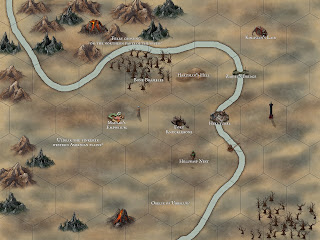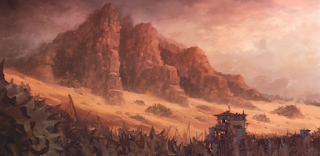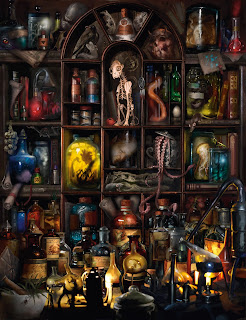Avernus travel rules
Hexcrawl procedures
Travel is abstracted to moving between hexes on the map. Hexes might contain special locations that the PCs can visit if they find it (some locations are trivially found, such as following a road to a city, others might be hidden).
When traveling between hexes, there is a chance for random encounters to take place.
Each traveling day is separated into 2 half-days (roughly 4 hr travel periods).
The party as a group can select one main action per half-day from the following list:
- Travel: move to an adjacent hex. Normal travel time is ½ hex per half-day on foot, and 1 hex per half-day with a war-machine. Terrain can modify this.
- Forage: look for food / water. Everyone makes a Survival check at DC 15. Every point the DC is passed by yields 1 days worth of rations (normally).
Note: in Avernus, all checks for Foraging are made with Disadvantage! - Search: search the hex for a special location. Success depends on the context of the search.
Additionally, each character can select a secondary action from the following list:
- Scout: Helps avoid surprise encounters, chance to find the keyed location of the hex.
- Cover tracks: In case the party doesn’t want to be followed…
- Forage: The character keeps an eye out for food and water as the party is traveling. Same mechanics as above, but roll with disadvantage.
Note: in Avernus, this secondary action is not available. Food and water is so scarce that it can only be found by dedicated search. - Navigate: in some circumstances the party might get lost in the wild / not reach the intended hex when moving. This is decided by a Survival check, the DC is hidden.
- Anything meaningful the players think of in the moment.
- If no one uses a special action, the party as a whole can double their movement speed, but gain 1 level of exhaustion.
At the end of the days travel, each character must consume 1 days worth of ration, or suffer 1 level of exhaustion.
Exhaustion (DnD 5e rules)
Some Special Abilities and environmental Hazards, such as starvation and the long-term Effects of freezing or scorching temperatures, can lead to a Special condition called exhaustion. Exhaustion is measured in six levels. An Effect can give a creature one or more levels of exhaustion, as specified in the effect’s description.
- Disadvantage on Ability Checks
- Speed halved
- Disadvantage on Attack rolls and Saving Throws
- Hit point maximum halved
- Speed reduced to 0
- Death
If an already exhausted creature suffers another Effect that causes exhaustion, its current level of exhaustion increases by the amount specified in the effect’s description.
A creature suffers the Effect of its current level of exhaustion as well as all lower levels. For example, a creature suffering level 2 exhaustion has its speed halved and has disadvantage on Ability Checks.
An Effect that removes exhaustion reduces its level as specified in the effect’s description, with all exhaustion Effects Ending if a creature’s exhaustion level is reduced below 1.
Finishing a Long Rest reduces a creature’s exhaustion level by 1, provided that the creature has also ingested some food and drink.
---
Infernal Warmachines
Infernal war machines have the following attributes:
- Creature capacity: how many dudes can they carry
- Cargo capacity: the weight of cargo it can carry
- AC: as usual
- HP: basically as usual. If the HP drops to 0, the machine is wrecked. The machines lost HP can be recovered by repairing.
- Damage threshold: damaging an infernal war machine works a little different than usual. Roll damage as normal, and then divide the result by the war machines Damage Threshold, and finally floor the result. This is the damage to the war machine (ergo any damage below the machines damage threshold is ignored).
- Mishap Threshold: If the damage taken by the machine is at least the mishap threshold, then something fancy happens: roll on the Mishap Table
- Handling: this bonus is added to any Driving (Dex) test that the PC has to make with the war machine.
- Fuel efficiency: the number of moves the war machine can make by expending 1 soul coin.
Combat
If the war machines are fighting, the pilots should make Handling checks and compare. They can attempt 3 possible actions:
- Escape: disengage from combat (and initiate a chase if the other party decides to pursue)
- Ranged attack: allow those operating the weapons stations to line up a better shot, while avoiding the shots of enemies. Provides advantage for ranged attacks, and disadvantage to ranged attacks of enemies.
- Board: manoeuvre near the enemy war machine to allow for boarding. Boarding requires a DC 15 Dex check.





Megjegyzések
Megjegyzés küldése